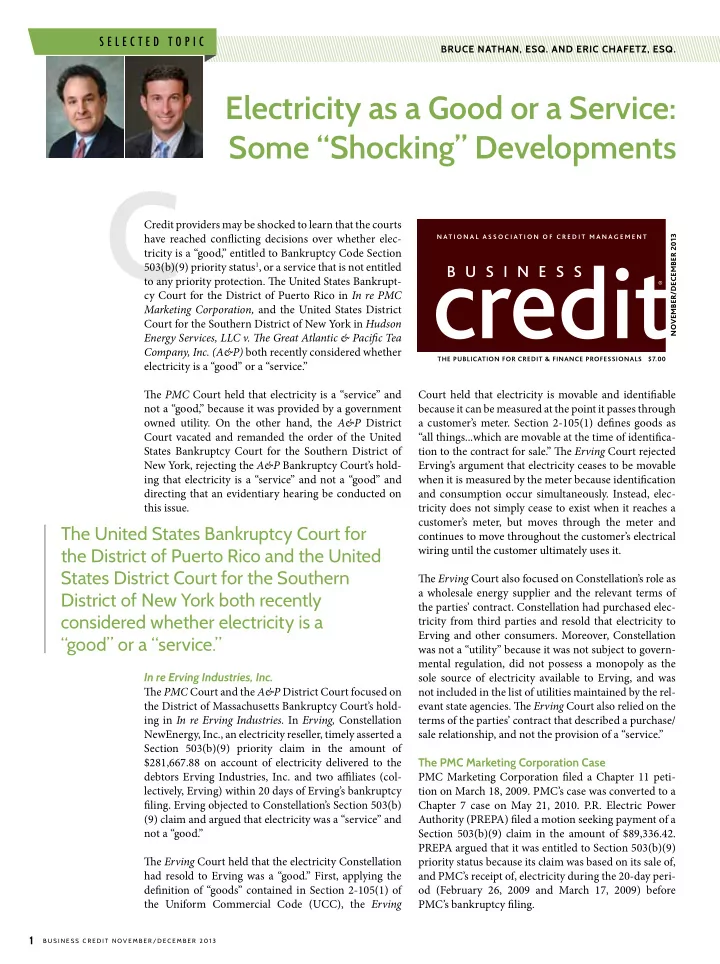

S e l e c t e d t o p i c BruCe NaThaN, esq. aNd eriC ChafeTZ, esq. Electricity as a Good or a Service: Some “Shocking” Developments C Credit providers may be shocked to learn that the courts NOVEMBER/DECEMBER 2013 have reached confmicting decisions over whether elec- N AT I O N A L A S S O C I AT I O N O F C R E D I T M A N A G E M E N T tricity is a “good,” entitled to Bankruptcy Code Section 503(b)(9) priority status 1 , or a service that is not entitled to any priority protection. Tie United States Bankrupt- cy Court for the District of Puerto Rico in In re PMC Marketing Corporation, and the United States District Court for the Southern District of New York in Hudson Energy Services, LLC v. Tie Great Atlantic & Pacifjc Tea Company, Inc. (A&P) both recently considered whether THE PUBLICATION FOR CREDIT & FINANCE PROFESSIONALS $7.00 electricity is a “good” or a “service.” Tie PMC Court held that electricity is a “service” and Court held that electricity is movable and identifjable not a “good,” because it was provided by a government because it can be measured at the point it passes through owned utility. On the other hand, the A&P District a customer’s meter. Section 2-105(1) defjnes goods as Court vacated and remanded the order of the United “all things...which are movable at the time of identifjca- States Bankruptcy Court for the Southern District of tion to the contract for sale.” Tie Erving Court rejected New York, rejecting the A&P Bankruptcy Court’s hold- Erving’s argument that electricity ceases to be movable ing that electricity is a “service” and not a “good” and when it is measured by the meter because identifjcation directing that an evidentiary hearing be conducted on and consumption occur simultaneously. Instead, elec- this issue. tricity does not simply cease to exist when it reaches a customer’s meter, but moves through the meter and the united states Bankruptcy Court for continues to move throughout the customer’s electrical wiring until the customer ultimately uses it. the district of Puerto rico and the united states district Court for the southern Tie Erving Court also focused on Constellation’s role as a wholesale energy supplier and the relevant terms of district of new York both recently the parties’ contract. Constellation had purchased elec- considered whether electricity is a tricity from third parties and resold that electricity to Erving and other consumers. Moreover, Constellation “good” or a “service.” was not a “utility” because it was not subject to govern- mental regulation, did not possess a monopoly as the In re Erving Industries, Inc. sole source of electricity available to Erving, and was Tie PMC Court and the A&P District Court focused on not included in the list of utilities maintained by the rel- the District of Massachusetts Bankruptcy Court’s hold- evant state agencies. Tie Erving Court also relied on the ing in In re Erving Industries. In Erving, Constellation terms of the parties’ contract that described a purchase/ NewEnergy, Inc., an electricity reseller, timely asserted a sale relationship, and not the provision of a “service.” Section 503(b)(9) priority claim in the amount of $281,667.88 on account of electricity delivered to the The PMC Marketing Corporation Case debtors Erving Industries, Inc. and two affjliates (col- PMC Marketing Corporation fjled a Chapter 11 peti- lectively, Erving) within 20 days of Erving’s bankruptcy tion on March 18, 2009. PMC’s case was converted to a fjling. Erving objected to Constellation’s Section 503(b) Chapter 7 case on May 21, 2010. P.R. Electric Power (9) claim and argued that electricity was a “service” and Authority (PREPA) fjled a motion seeking payment of a not a “good.” Section 503(b)(9) claim in the amount of $89,336.42. PREPA argued that it was entitled to Section 503(b)(9) Tie Erving Court held that the electricity Constellation priority status because its claim was based on its sale of, had resold to Erving was a “good.” First, applying the and PMC’s receipt of, electricity during the 20-day peri- defjnition of “goods” contained in Section 2-105(1) of od (February 26, 2009 and March 17, 2009) before the Uniform Commercial Code (UCC), the Erving PMC’s bankruptcy fjling. 1 B u s i n e s s C r e d i t n o v e m B e r / d e C e m B e r 2 0 1 3
Recommend
More recommend